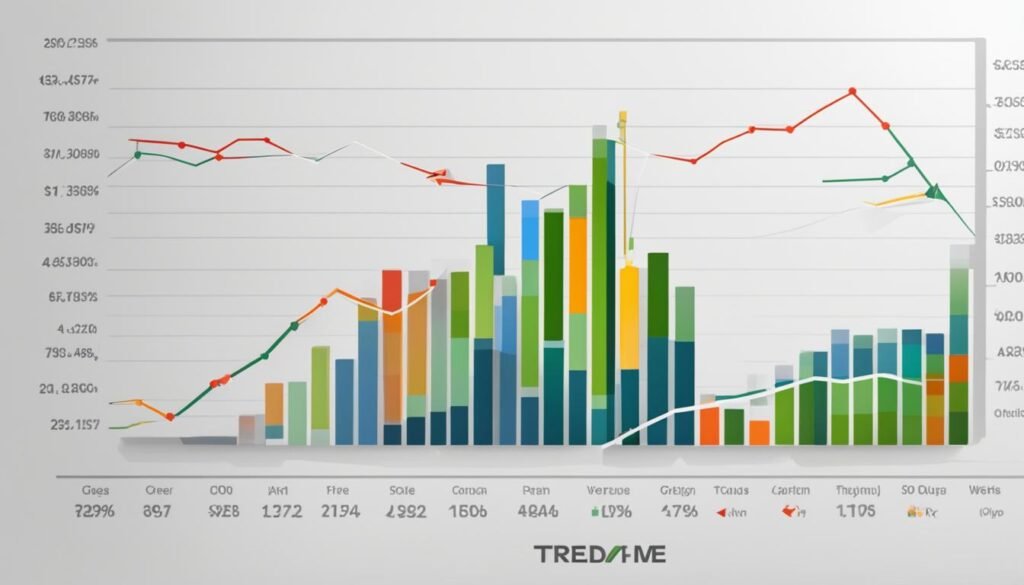In today’s digital age, online marketing has become crucial for the success of any business. To create effective online advertising strategies, it’s important to understand the fundamentals of online marketing, such as defining your target audience and setting clear goals. Additionally, leveraging your website and implementing content marketing, social media marketing, email marketing, paid advertising, and influencer marketing can help drive success in the digital landscape. Measuring and adapting your strategies based on analytics will enable continuous improvement, and staying up-to-date with the latest trends and technologies is essential for staying competitive.
Key Takeaways:
- Online advertising is crucial for the success of any business in the digital age.
- Defining your target audience and setting clear goals is fundamental to effective online advertising.
- Implementing content marketing, social media marketing, email marketing, paid advertising, and influencer marketing can drive success in the digital landscape.
- Measuring and adapting your strategies based on analytics is essential for continuous improvement.
- Staying up-to-date with the latest trends and technologies is crucial for staying competitive in online advertising.
Understanding the Basics of Online Marketing
Before diving into specific online advertising strategies, it’s important to have a solid understanding of the basics of online marketing. This includes defining your target audience and conducting thorough market research to create accurate buyer personas. By identifying your target audience, you can tailor your marketing messages and content to resonate with them on a deeper level.
Furthermore, setting clear and specific goals is crucial in developing an effective online marketing strategy. These goals should be measurable and time-bound, allowing you to track your progress and evaluate the success of your marketing efforts. Whether your aim is to increase website traffic, generate leads, or boost conversions, having well-defined goals will guide your marketing strategy.
Another essential aspect of online marketing is website optimization. Your website is the cornerstone of your online presence, serving as a hub for your marketing efforts. Optimizing your website for speed, mobile responsiveness, and search engine optimization (SEO) will ensure that it provides a seamless user experience and attracts organic traffic from search engines. Additionally, implementing relevant keywords throughout your website will improve its visibility in search engine results, increasing your chances of reaching your target audience.
Crafting Effective Online Advertising Strategies
When it comes to online advertising, crafting effective strategies is essential for reaching and engaging your target audience. There are various tactics that can be implemented to maximize your online presence and drive results. In this section, we will explore some key strategies including content marketing, social media marketing, email marketing, paid advertising, and influencer marketing.
Content Marketing
Content marketing involves creating high-quality, engaging, and valuable content that resonates with your audience. By providing informative blog posts, articles, videos, and infographics, you can establish your brand as a thought leader and build trust with your customers. It’s important to develop a content strategy that aligns with your business goals and target audience, ensuring that your content is relevant and valuable to your readers.
“Content marketing is all about creating and delivering content that provides value to your audience. By consistently producing high-quality content that addresses their pain points and offers solutions, you can establish your brand as a trusted authority in your industry.”
Social Media Marketing
Social media marketing is a powerful tool for reaching and engaging your target audience on platforms that they actively use. By creating compelling and shareable content, you can increase brand awareness, drive traffic to your website, and foster meaningful connections with your followers. Each social media platform has its own unique features and audience demographics, so it’s important to tailor your content and messaging accordingly.
Email Marketing
Email marketing remains one of the most effective ways to nurture customer relationships, drive conversions, and generate repeat business. By building a subscriber list and sending personalized, targeted emails, you can deliver relevant content and offers directly to your audience’s inbox. It’s important to segment your email list based on customer preferences and behaviors to ensure that your emails are highly relevant and engaging.
Table: Comparison of Paid Advertising Channels
| Platform | Reach | Targeting Options | Cost |
|---|---|---|---|
| Google Ads | Extensive reach with high search volumes | Precise targeting based on keywords, demographics, and browsing behavior | Varies based on competition and bidding |
| Facebook Ads | Massive user base with diverse demographics | Advanced targeting based on interests, demographics, and behavior | Budget-friendly with flexible ad spend options |
| Instagram Ads | Engaged user base with a focus on visual content | Precision targeting based on interests, demographics, and behavior | Varies based on competition and bidding |
| LinkedIn Ads | Professional network with a focus on B2B targeting | Narrow targeting options based on job title, industry, and company size | Higher cost per click compared to other platforms |
In conclusion, crafting effective online advertising strategies involves leveraging various tactics such as content marketing, social media marketing, email marketing, paid advertising, and influencer marketing. By understanding your target audience and tailoring your content and messaging to their needs and preferences, you can effectively reach and engage your audience in the digital landscape.
Measuring and Adapting Your Online Advertising Efforts
Measuring the effectiveness of your online advertising efforts is crucial for continuous improvement and optimizing your campaigns. By leveraging analytics tools, you can gather valuable insights into the performance of your online advertising strategies. Google Analytics is a powerful tool that provides in-depth data on your website’s traffic sources, conversion tracking, and audience demographics. With this information, you can identify which advertising channels are driving the most traffic and conversions.
Social media platforms also offer their own set of analytics tools that provide insights into your audience’s behavior and engagement. Social media insights can help you understand which content resonates the most with your followers and which platforms are most effective for reaching your target audience. By analyzing this data, you can make data-driven decisions to optimize your social media advertising efforts.
Email marketing is another effective online advertising strategy, and measuring the performance of your email campaigns is essential. Key metrics to track include open rate, click-through rate, and conversion rate. By monitoring these metrics, you can identify areas for improvement and make necessary adjustments to your email marketing strategy.
“Data-driven decision-making is crucial in today’s digital landscape. By consistently measuring and analyzing the performance of your online advertising efforts, you can adapt your strategies to maximize results and drive success.”
Adapting your online advertising efforts based on data and metrics is an ongoing process. Continuously test different ad creatives, landing pages, and targeting options to optimize your campaigns. By making data-driven adjustments, you can ensure that your online advertising efforts are effective and aligned with your business goals.

| Metric | Description |
|---|---|
| Impressions | The number of times your ads were shown to users |
| Click-through Rate (CTR) | The percentage of users who clicked on your ads after seeing them |
| Conversion Rate | The percentage of users who completed a desired action, such as making a purchase or filling out a form |
| Cost per Click (CPC) | The average cost you pay for each click on your ads |
| Return on Ad Spend (ROAS) | The revenue generated for every dollar spent on advertising |
Staying Up-to-Date with Online Advertising Trends
In today’s ever-evolving digital landscape, it is crucial for businesses to stay up-to-date with the latest online advertising trends to remain competitive. By embracing emerging technologies and adapting your strategies, you can unlock new opportunities and reach your target audience more effectively. In this section, we will explore four key trends in online advertising: voice search, video marketing, chatbots, and data privacy.
Voice Search
Voice search has gained significant traction with the rise of smart speakers and voice-activated devices. It is estimated that by 2022, voice-based shopping will generate $40 billion in sales. To optimize for voice search, it is important to focus on long-tail keywords, conversational language, and provide concise answers to commonly asked questions. By embracing voice search, you can enhance user experience and capture a growing segment of the market.
Video Marketing
Video marketing is a powerful tool for creating engaging visual experiences that resonate with your audience. With the increasing popularity of platforms like YouTube and TikTok, video content has become a dominant force in online advertising. By leveraging video marketing, you can tell compelling stories, showcase product demos, and engage your audience in a more immersive way. Remember to optimize your videos for mobile devices and ensure they are easily shareable on social media channels.
Chatbots
Chatbots are revolutionizing customer service and engagement in online advertising. By leveraging artificial intelligence, chatbots can provide instant responses to customer inquiries, offer personalized recommendations, and streamline the buying process. Integrating chatbots into your website or messaging apps can enhance user experience, save time, and increase customer satisfaction. However, it’s important to strike the right balance between automation and human interaction to ensure a seamless customer journey.
Data Privacy
Data privacy regulations, such as the General Data Protection Regulation (GDPR) and the California Consumer Privacy Act (CCPA), have significantly impacted the way businesses handle customer data. It is crucial to prioritize data privacy and ensure compliance with these regulations to build trust with your audience. Implementing transparent data collection practices, providing clear opt-in and opt-out mechanisms, and securing customer data are essential steps towards maintaining a strong online reputation.
| Trend | Key Points |
|---|---|
| Voice Search | – Optimize for long-tail keywords – Use conversational language – Provide concise answers to common questions |
| Video Marketing | – Create engaging video content – Optimize for mobile devices – Encourage social media sharing |
| Chatbots | – Provide instant responses to inquiries – Personalize recommendations – Streamline the buying process |
| Data Privacy | – Prioritize data privacy – Comply with regulations – Secure customer data |
Conclusion
In today’s rapidly evolving digital landscape, online advertising has become a vital tool for businesses looking to achieve growth and success. By harnessing the power of digital marketing strategies, you can unlock new opportunities and establish a strong online presence.
Throughout this article, we explored the fundamentals of online marketing and the importance of defining your target audience and setting clear goals. We delved into various effective online advertising strategies, including content marketing, social media marketing, email marketing, paid advertising, and influencer marketing.
Measuring the effectiveness of your online advertising efforts is crucial for continuous improvement. Tools like Google Analytics, social media insights, and email campaign metrics provide invaluable data to help you optimize your strategies. Additionally, staying up-to-date with the latest online advertising trends, such as voice search, video marketing, chatbots, and data privacy regulations, will ensure you remain competitive in the digital realm.
By implementing these strategies and staying informed, you can drive business growth and stand out from the competition. Remember to adapt your strategies based on analytics and customer feedback, while delivering exceptional value and experiences to your audience. With the right online advertising techniques, you can unlock the full potential of digital marketing and achieve the success your business deserves.
FAQ
What is online marketing?
Online marketing refers to the strategies and tactics used to promote products or services on the internet. It involves various techniques such as content marketing, social media marketing, email marketing, and paid advertising to reach and engage with target audiences.
How do I define my target audience?
Defining your target audience involves conducting market research and creating buyer personas. This helps you understand your ideal customers’ demographics, interests, and pain points, allowing you to tailor your marketing messages and content to resonate with them.
Why is it important to set clear goals for online marketing?
Setting clear goals that are specific, measurable, and time-bound is essential for measuring the success of your online marketing efforts. Goals provide direction and allow you to track your progress, making it easier to identify what strategies are working and what needs improvement.
How can I optimize my website for online marketing?
To optimize your website for online marketing, focus on improving its speed, mobile responsiveness, and search engine optimization (SEO). This involves optimizing page load times, ensuring your site is mobile-friendly, and optimizing your content with relevant keywords to improve search engine rankings.
What is content marketing and why is it important?
Content marketing involves creating and distributing valuable, relevant, and engaging content to attract and retain a target audience. It helps build brand awareness, establish thought leadership, and drive customer engagement and conversions by providing valuable information and solving customer problems.
How can I use social media marketing effectively?
Social media marketing involves using social media platforms to connect and engage with your target audience. To use it effectively, identify the platforms your audience uses most, create engaging content, interact with your followers, and leverage social media advertising options to expand your reach and drive conversions.
What is email marketing and how can it benefit my business?
Email marketing involves sending targeted emails to a list of subscribers to nurture relationships, promote products or services, and drive conversions. It can benefit your business by allowing you to directly reach your audience, personalize messages, automate campaigns, and track performance metrics to optimize your strategy.
How can paid advertising help my online visibility?
Paid advertising, such as Google Ads and social media ads, can provide immediate results and increase your online visibility. By targeting specific keywords and demographics, you can reach a wider audience, increase brand awareness, and drive traffic to your website or landing pages.
What is influencer marketing and how can it be effective?
Influencer marketing involves collaborating with individuals who have a strong online presence and a loyal following to promote your products or services. By leveraging their social influence and credibility, you can tap into their audience and expand your reach, driving brand awareness, engagement, and conversions.
How can I measure the effectiveness of my online advertising efforts?
Measuring the effectiveness of your online advertising efforts involves using analytics tools such as Google Analytics and social media insights. These tools provide valuable data on website traffic, conversion rates, audience demographics, and engagement metrics, allowing you to track the performance of your campaigns and make data-driven decisions.
What are some online advertising trends to stay up-to-date with?
Some online advertising trends to stay up-to-date with include optimizing for voice search, using video marketing to engage your audience, implementing chatbots for instant customer support, and staying informed about data privacy regulations to ensure compliance. These trends can help you stay competitive and reach your target audience effectively.
How can online advertising strategies help my business grow?
Online advertising strategies can help your business grow by increasing brand awareness, driving website traffic, attracting and nurturing leads, and ultimately driving conversions and sales. By implementing effective strategies and continuously adapting based on analytics and customer feedback, you can achieve business growth and stand out from the competition in the digital landscape.





